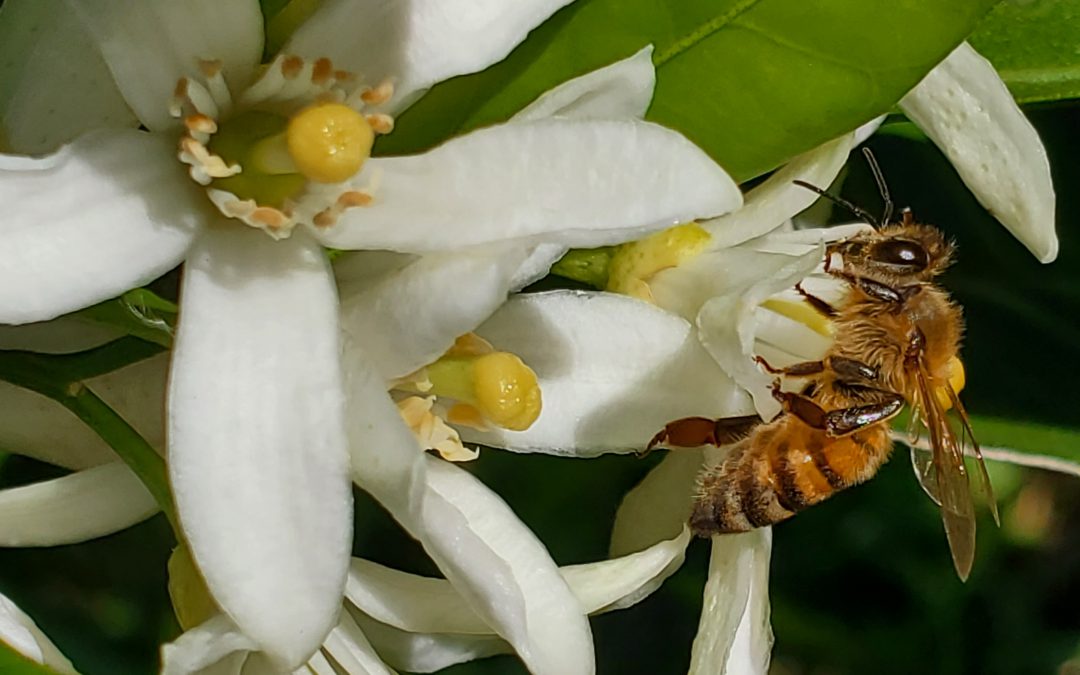
by Evan Anderson | May 18, 2022
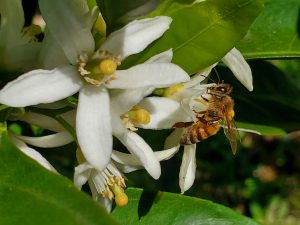 When people think of livestock, honeybees may not be the first thing that comes to mind. Bees are, however, a very significant part of agriculture. It is estimated that 30% of the crops we use for food are pollinated by honeybees. That’s around $15 billion of crops! On top of that, these hardworking insects also produce honey, wax, and other products that we can use.
When people think of livestock, honeybees may not be the first thing that comes to mind. Bees are, however, a very significant part of agriculture. It is estimated that 30% of the crops we use for food are pollinated by honeybees. That’s around $15 billion of crops! On top of that, these hardworking insects also produce honey, wax, and other products that we can use.
For those who want to get into the world of beekeeping, it can be a challenge to absorb all the information that’s out there. Thankfully, there are resources out there to assist. If you or someone you know are interested in apiculture, you might try:
Online resources. The University of Florida (UF) publishes research-based information in its EDIS publications. For topics relating to beekeeping specifically, you can go here: https://edis.ifas.ufl.edu/entity/topic/beekeeping. From there you can find links to specific publications, such as the Florida Beekeeping Management Calendar and much more. UF also has a Honey Bee Research and Extension Lab with online resources about their Master Beekeeper program and Bee College at https://entnemdept.ufl.edu/honey-bee/.
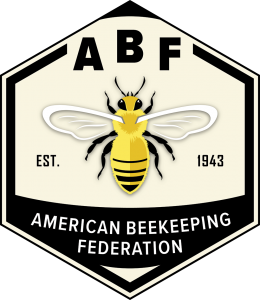 The American Beekeeping Federation maintains a website with tons of information on beekeeping at https://www.abfnet.org/. From there you can join the federation, find local groups, and find nationwide educational opportunities and resources for beekeepers.
The American Beekeeping Federation maintains a website with tons of information on beekeeping at https://www.abfnet.org/. From there you can join the federation, find local groups, and find nationwide educational opportunities and resources for beekeepers.
The Florida Department of Agriculture and Consumer Services (FDACS) requires beekeepers to register hives. You can find information on that here: https://www.fdacs.gov/Agriculture-Industry/Bees-Apiary/Apiary-Inspection. This site has a lot of extra information on beekeeping and links to other resources as well!
Local Resources. While digital sources of information can help, nothing can take the place of simply having other beekeepers to go to for answers. Local beekeeping organizations are a great place to start. Listed by county, here are some from across the panhandle:
As always, your local Extension office is available for help as well. Happy beekeeping!
by Ray Bodrey | Apr 28, 2022
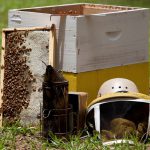 University of Florida IFAS Extension and the Beekeeping in the Panhandle Working Group have once again teamed up to offer the 9th Annual Beekeeping in the Panhandle Conference on Friday May 6th and Saturday May 7th 2022 at the Washington County Ag Center Auditorium.
University of Florida IFAS Extension and the Beekeeping in the Panhandle Working Group have once again teamed up to offer the 9th Annual Beekeeping in the Panhandle Conference on Friday May 6th and Saturday May 7th 2022 at the Washington County Ag Center Auditorium.
This year’s event will feature: Hands-on open hive experiences, presentations on the latest in research-based beekeeping management practices, interaction with expert beekeepers, vendors with beekeeping equipment, and hive products. Door prizes will be available as well!
The registration fee for the event will be $35 for one day or $55 for both days and $15 per day for youth 12 and under.
The activities will take place from 8:00 am – 5:00 pm Central Standard Time each day and will include a catered lunch.
Location: 1424 Jackson Avenue, Chipley, FL
Ways to register:
Registration link: https://www.eventbrite.com/e/9th-annual-beekeeping-in-the-panhandle-conference-trade-show-tickets-269199873067
Or drop by the Washington County Office at 1424 Jackson Avenue in Chipley.
For more information contact Washington County Extension Office at (850) 638-6180.
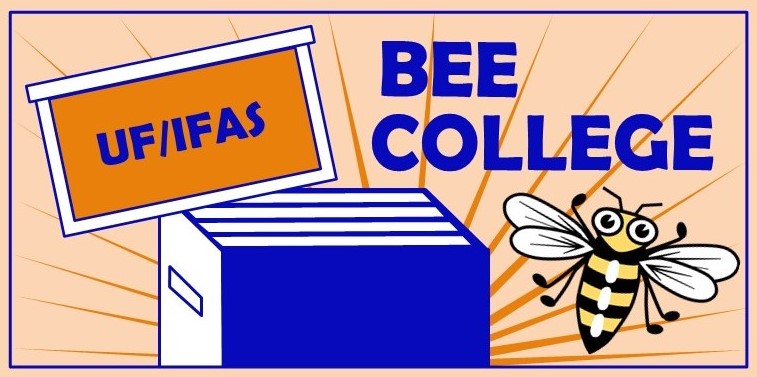
by Matthew Orwat | Feb 18, 2021
Join the University of Florida/Institute of Food and Agricultural Sciences (UF/IFAS) Honey Bee Research and Extension Laboratory for the 2021
Spring Virtual UF/IFAS Bee College! Imagine
FOUR Saturday mornings in March 2021 of all things honey bees. Those new to beekeeping can follow the beginner track, while more experienced beekeepers can participate in sessions focused on honey bee stressors and other advanced topics related to beekeeping. Speakers include UF/IFAS faculty, staff, students, members from the Florida State Beekeepers Association, specialists from Bee Informed Partnership, and other honey bee specialists around the world! Participants can choose to attend one session or all four as a
“Package Deal” for a reduced fee.
Register for the “Package Deal” or for each session separately– whatever works best with your schedule.
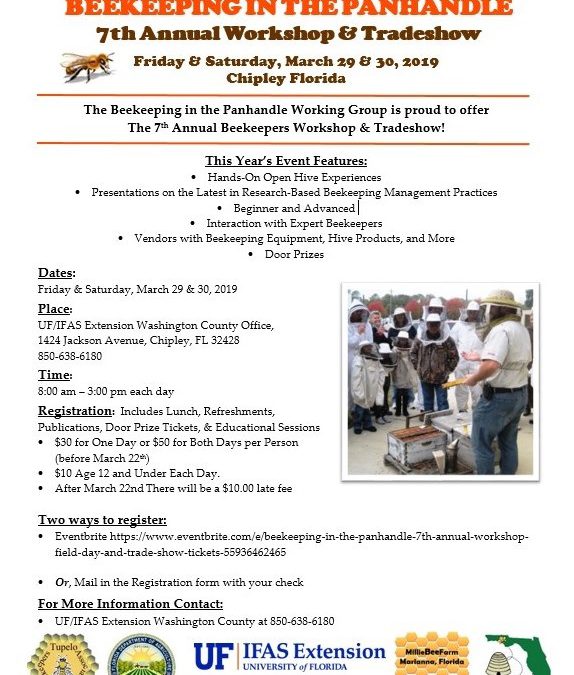
by Matthew Orwat | Mar 26, 2019
Beekeepers Workshop & Trade Show March 29 & 30 2019
The University of Florida IFAS Extension and the Beekeeping in the Panhandle Working Group has once again teamed up to offer the 7th Annual Beekeeper’s Workshop & Tradeshow on March 29th and 30th at the Washington County Agriculture Center, 1424 Jackson Avenue, Chipley, FL 32428. The activities will take place from 8:00 am – 4:00 pm Central each day and will include lunch.
This year’s event features: Hands-on open hive experiences, presentations on the latest in research-based beekeeping management practices, interaction with expert beekeepers, vendors with beekeeping equipment, and hive products. Door prizes will be available as well!
The registration fee for the event is $30 for one day or $50 for both days per person over 12, and $10 per day for kids 12 and under. (All Late Fees Waived)
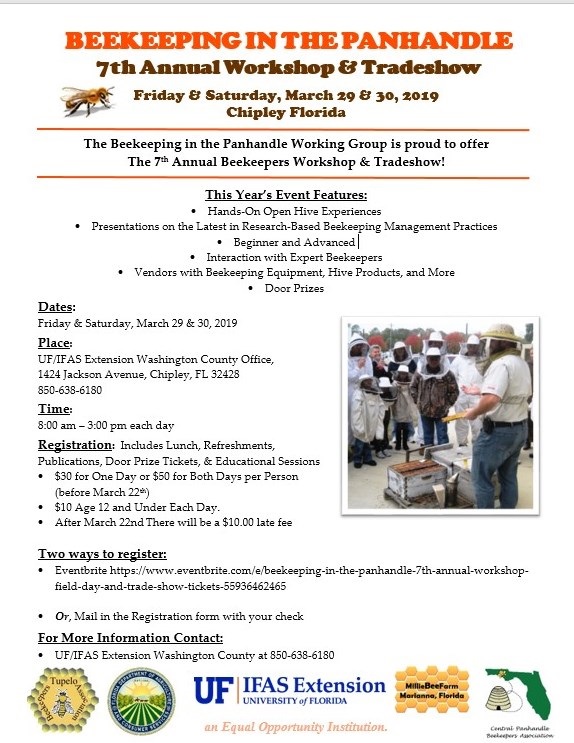
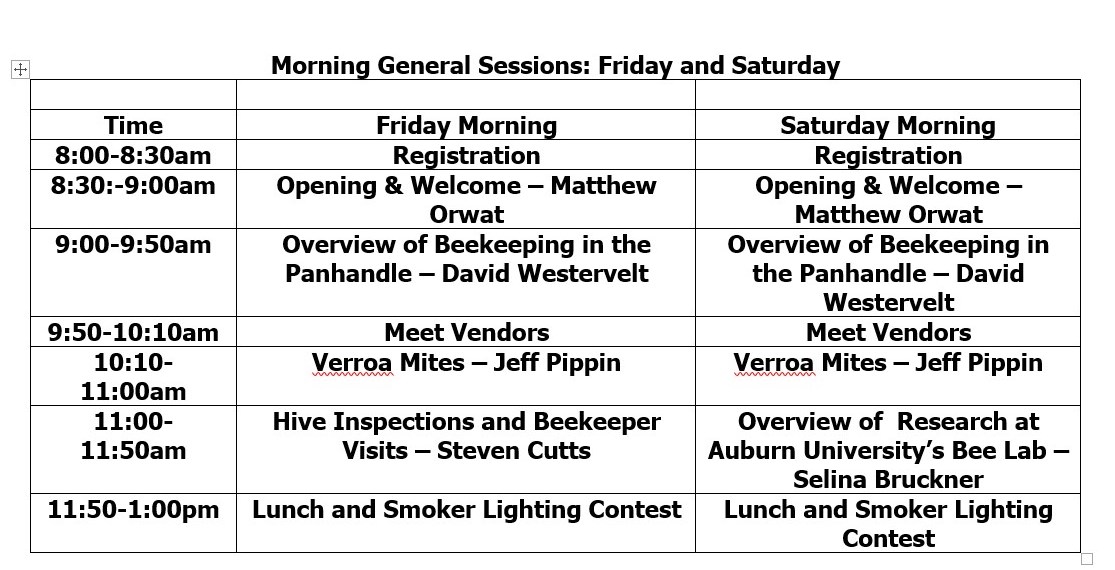
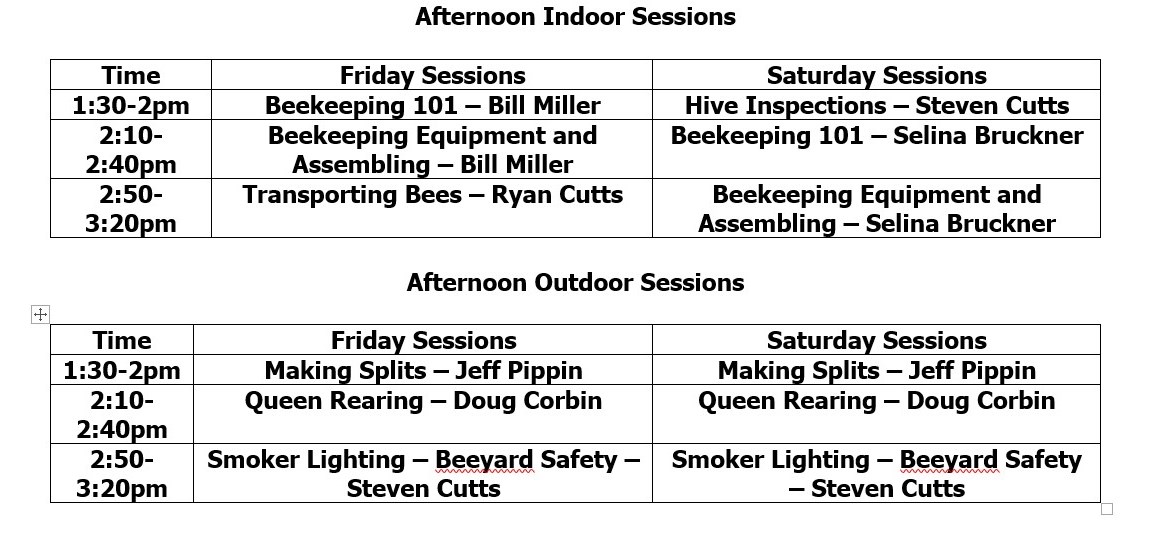
Beekeeping Q&A and Door Prizes – 3:20-4:00pm
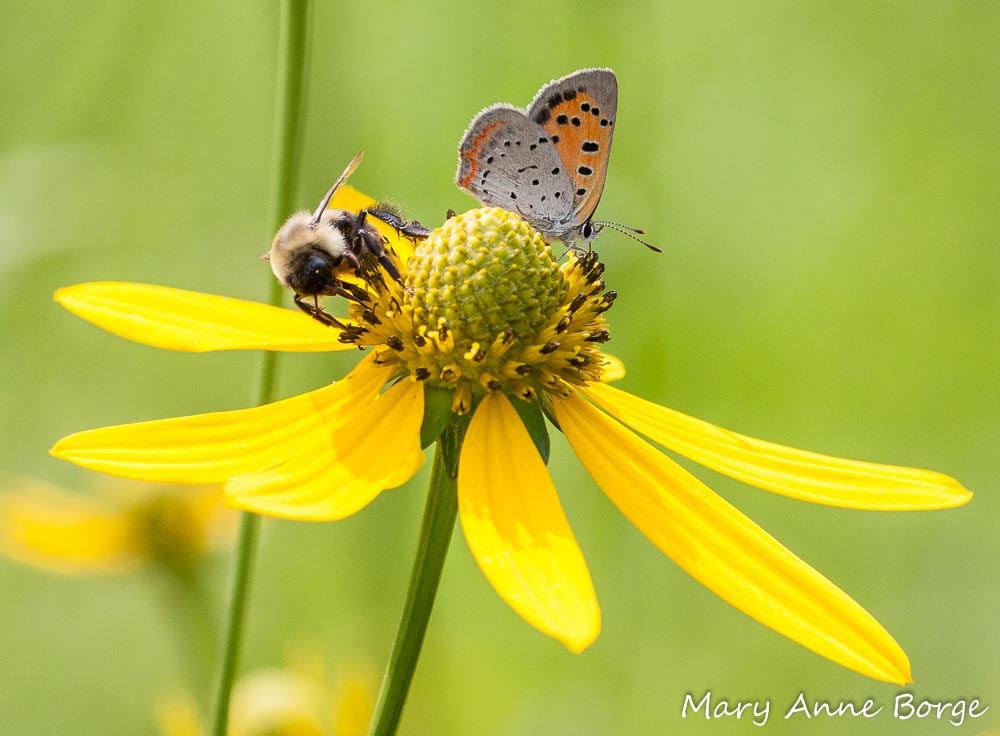
by Sheila Dunning | May 22, 2015
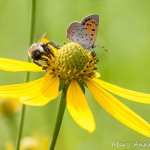 Everyone with a landscape can make a difference for pollinators. Simply Having Areas Reserved for the Environment enables homeowners, land managers, farmers, individuals, corporations, schools, roadside managers, and golf courses to increase the number of pollinators in the area by making conscious choices to include plants that provide essential habitat for bees, bats, birds, butterflies, moths, beetles, and hummingbirds. What better time than during National Pollinator Week, June 15-21, 2015.
Everyone with a landscape can make a difference for pollinators. Simply Having Areas Reserved for the Environment enables homeowners, land managers, farmers, individuals, corporations, schools, roadside managers, and golf courses to increase the number of pollinators in the area by making conscious choices to include plants that provide essential habitat for bees, bats, birds, butterflies, moths, beetles, and hummingbirds. What better time than during National Pollinator Week, June 15-21, 2015.
Initiated and managed by the North American Pollinator Protection Campaign, National Pollinator Week was unanimously approved and designated by the U.S. Senate in 2007. Each year since, the U.S. Secretary of Agriculture has signed the proclamation in an effort to address the urgent issue of declining pollinator populations.
Worldwide there is evidence that pollinating animals have suffered from loss of habitat, pesticide misuse, competition from invasive species, disease, and parasites. Many pollinators are federally “listed species”, meaning that there is documented information confirming the disappearance and/or significant population reduction in natural areas. The United States has lost over 50% of its managed honeybee colonies over the past ten years. The European Union has been so concerned that they invested over $20 million investigating the status of pollinators in Europe.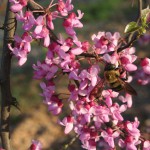
Pollinator health affects everyone. Worldwide, roughly 1,000 plants grown for food, beverages, fibers, spices, and medicines need to be pollinated by animals in order to produce the goods on which we depend. Food and beverages produced with the help of pollinators include: apples, blueberries, chocolate, coffee, melons, peaches, potatoes, pumpkins, vanilla, almonds, and tequila. In the U.S., pollination by honey bees, native bees, and other insects produces $40 billion worth of products annually.
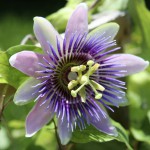 The native plants that can be identified and preserved or introduced include trees, shrubs, vines and perennials. Some of them include: Eastern Redbud (Cercis canadensis), Highbush Blueberry (Vaccinium spp.), Passionflower (Passiflora spp.), Coreopsis (Coreopsis spp.), Goldenrod (Solidago spp.), Black-eyed Susan (Rudbeckia hirta), and Butterfly Milkweed (Asclepias tuberosa). Simply identifying and avoiding damaging many of the existing native plants will allow anyone to provide important homes and food for many different pollinating animals. During National Pollinator Week S.H.A.R.E. your space.
The native plants that can be identified and preserved or introduced include trees, shrubs, vines and perennials. Some of them include: Eastern Redbud (Cercis canadensis), Highbush Blueberry (Vaccinium spp.), Passionflower (Passiflora spp.), Coreopsis (Coreopsis spp.), Goldenrod (Solidago spp.), Black-eyed Susan (Rudbeckia hirta), and Butterfly Milkweed (Asclepias tuberosa). Simply identifying and avoiding damaging many of the existing native plants will allow anyone to provide important homes and food for many different pollinating animals. During National Pollinator Week S.H.A.R.E. your space.
For additional information:
UF Native Buzz
Gardening for Pollinators
Minimizing Honey Bee Exposure to Pesticides
The Xerces Society

 When people think of livestock, honeybees may not be the first thing that comes to mind. Bees are, however, a very significant part of agriculture. It is estimated that 30% of the crops we use for food are pollinated by honeybees. That’s around $15 billion of crops! On top of that, these hardworking insects also produce honey, wax, and other products that we can use.
When people think of livestock, honeybees may not be the first thing that comes to mind. Bees are, however, a very significant part of agriculture. It is estimated that 30% of the crops we use for food are pollinated by honeybees. That’s around $15 billion of crops! On top of that, these hardworking insects also produce honey, wax, and other products that we can use.![]() The American Beekeeping Federation maintains a website with tons of information on beekeeping at https://www.abfnet.org/. From there you can join the federation, find local groups, and find nationwide educational opportunities and resources for beekeepers.
The American Beekeeping Federation maintains a website with tons of information on beekeeping at https://www.abfnet.org/. From there you can join the federation, find local groups, and find nationwide educational opportunities and resources for beekeepers.









